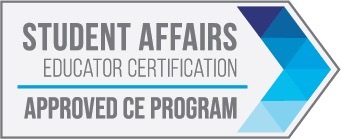
Leveraging Your Student Affairs & Academic Support Strengths to Build Community in Meaningful Ways Through First-Year Seminar Instruction
- Registration Closed
The first-year seminar is a high-impact practice that can be used to deepen academic engagement, student connections, collaborative learning, and critical reflection and self-discovery. Student affairs, academic support, and student success professionals bring significant strengths that can be used to create a community within these courses in meaningful ways. In this session, panelists will explore how they have intentionally leveraged their strengths to build community actors as seminar inst.
Learning Outcomes:
- Describe how the first-year seminar impacts student success and persistence.
- Identify at least 1 strength of their role in student affairs and academic support that can assist in intentionally building community in a first-year seminar course.
- Articulate their role in building community with other first-year seminar instructors on their campuses with an intentional focus on building community in FYS courses.
Brett Bruner
Assistant Vice President for Student Success & Persistence
Wichita State University
Karen McCullough
Director of Career Services
Fort Hays State University
Megan Wyett Lennon
Associate Chief Student Affairs Officer
Amherst College
Dana Tribble
Assistant Professor of Student Affairs Administration
Arkansas Tech University
Jennifer Granger Sullivan
Director of Experiential Learning/Co-Director of First Year Seminar
Elms College
Ben Moran
Tutoring Coordinator
Missouri Western State University
Continuing Education Credits
This session counts for 1.0 CSAEd-CORE credit
NASPA has been approved by the Higher Education Consortium for Student Affairs Certification to provide CE credit for Certified Student Affairs Educators (CSAEd). NASPA is solely responsible for all aspects of this program.
Guidelines for earning CE credit:
No partial credit will be rewarded.
Credit is available for attending the live session or viewing the on-demand recording, not both. While on-demand is available to registrants for 365 days, CSAEd credits and certificates must be retrieved no longer than 60 days after the event (June 7, 2024).
To receive CSAEd credit, attendees must complete the feedback survey that offers the certification in each session. Once you have attended all the live sessions or watched the on-demand sessions for which you would like to request credit, visit the Continuing Education (CE) website to fill out the Student Affairs Education Certification Request Form for all the sessions. All certificants must fill out one for the live session and a separate one for the on-demand sessions. Visit the Continued Education (CE) website to learn more regarding deadlines and receive your certificate of completion for the Virtual Conference.


